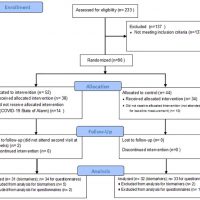- Auteur:
- Eduardo Anitua
- Diez GG
- Castellanos N
- Vázquez C
- Galindo-Villardón P
- Alkhraisat MH
The effect of mindfulness on the inflammatory, psychological and biomechanical domains of adult patients with low back pain: A randomized controlled clinical trial
Abstract
Objective: This study aims to study the effect of mindfulness-based program on the psychological, biomechanical and inflammatory domains of patients with chronic low back pain.
Methods: A multicentre randomized and controlled clinical trial of parallel groups in patients with chronic low back pain between March 2019 to March 2020. Participants with no experience in mindfulness based intervention, were randomized to receive (36 patients) or not (34 patients) mindfulness-based stress reduction program for chronic back pain (MBSR-CBP). The program was performed in 9 sessions. Patients with chronic low back pain due to symptomatic discopathy (degenerative disc disease or herniated disc) were included. The principal outcome was changes in the blood level of cortisol and cytokines (tumor necrosis factor- α (TNF- α), interleukin-1β (IL-1β), interleukin-6 (IL-6) and interleukin-17 (IL-17)). Secondary outcomes (psychological factors, pain, and quality of life) were measured by validated questionnaires.
Results: Of the 96 randomized patients, 70 who completed the study were included in the analysis (mean [range] age: 53 [33-73] years; 66% females). MBSR-CBP stopped the increase in cortisol, and reduced pro-inflammatory cytokine IL-1β (p = 0.05). It reduced depression (p = 0.046) and stress (p = 0.0438), perceived pain (p < 0.0001), and limitations related to health (p < 0.0001). It also increased the physical function (p = 0.002) and sleep quality (p = 0.05). Furthermore, it significantly increased life satisfaction (0.006), well-being (p = 0.001) and vitality (p < 0.0001). It also increased self-compassion (p < 0.0001) and significantly reduced the overidentification (p<0.0001) and catastrophization (p = 0.002).
Conclusions: MBSR-CBP could be part of a multidisciplinary approach in the management of patients suffering from chronic low back pain.

 Español
Español
 English
English
 Italiano
Italiano
 Português
Português

